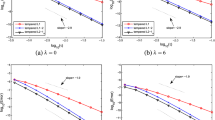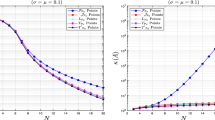Abstract
A novel second-order numerical approximation for the Riemann–Liouville tempered fractional derivative, called the tempered fractional-compact difference formula is derived by using the tempered Grünwald difference operator and its asymptotic expansion. Using the relationship between Riemann–Liouville and the Caputo tempered fractional derivatives, then the constructed approximation formula is applied to deal with the time-Caputo-tempered partial differential equation in time, while the spatial Riesz derivative are discretized by the fourth-order compact numerical differential formulas. By using the energy method, it is proved that the proposed algorithm to be unconditionally stable and convergent with order \({\mathcal {O}}\left( \tau ^2+h_1^4+h_2^4\right) \), where \(\tau \) is the temporal stepsize and \(h_1,h_2\) are the spatial stepsizes respectively. Finally, some numerical examples are performed to testify the effectiveness of the obtained algorithm.




Similar content being viewed by others
References
Alikhanov, A.A.: A new difference scheme for the time fractional diffusion equation. J. Comput. Phys. 280, 424–438 (2015)
Baeumer, B., Meerschaert, M.M.: Tempered stable Lévy motion and transient super-diffusion. J. Comput. Appl. Math. 233, 2438–2448 (2010)
Bu, W.P., Tang, Y.F., Wu, Y.C., Yang, J.Y.: Finite difference/finite element method for two-dimensional space and time fractional Bloch–Torrey equations. J. Comput. Phys. 293, 264–279 (2015)
Benson, D., Wheatcraft, S., Meerschaert, M.: Application of a fractional advection–dispersion equation. Water Resour. Res. 36, 1403–1413 (2000)
Çelik, C., Duman, M.: Finite element method for a symmetric tempered fractional diffusion equation. Appl. Numer. Math. 120, 270–286 (2017)
Chen, A., Li, C.P.: A novel compact ADI scheme for the time-fractional subdiffusion equation in two space dimensions. Int. J. Comput. Math. 93, 889–914 (2016)
Dehghan, M., Abbaszadeh, M.: A finite difference/finite element technique with error estimate for space fractional tempered diffusion-wave equation. Comput. Math. Appl. 75, 2903–2914 (2018)
Deng, W., Chen, M., Barkai, E.: Numerical algorithms for the forward and backward fractional Feynman–Kac equations. J. Sci. Comput. 62, 718–746 (2015)
Ding, H.F., Li, C.P., Chen, Y.Q.: High-order algorithms for Riesz derivative and their applications (II). J. Comput. Phys. 293, 218–237 (2015)
Ding, H.F., Li, C.P.: High-order algorithms for Riesz derivative and their applications (III). Fract. Calc. Appl. Anal. 19, 19–55 (2016)
Ding, H.F., Li, C.P.: High-order numerical algorithms for Riesz derivatives via constructing new generating functions. J. Sci. Comput. 71, 759–784 (2017)
Ding, H.F., Li, C.P.: High-order algorithms for Riesz derivative and their applications (V). Numer. Methods Partial Differ. Equ. 33, 1754–1794 (2017)
Gao, G.H., Sun, Z.Z., Zhang, H.W.: A new fractional numerical differentiation formula to approximate the Caputo fractional derivative and its applications. J. Comput. Phys. 259, 33–50 (2014)
Hao, Z., Cao, W., Lin, G.: A second-order difference scheme for the time fractional substantial diffusion equation. J. Comput. Appl. Math. 313, 54–69 (2017)
Hao, Z.P., Sun, Z.Z., Cao, W.R.: A fourth-order approximation of fractional derivatives with its applications. J. Comput. Phys. 281, 787–805 (2015)
Jin, B., Lazarov, R., Pasciak, J., Zhou, Z.: Error analysis of a finite element method for the space-fractional parabolic equation. SIAM. J. Numer. Anal. 52, 2272–2294 (2014)
Jin, B., Li, B., Zhou, Z.: Correction of high-order BDF convolution quadrature for fractional evolution equations. SIAM J. Sci. Comput. 39, A3129–A3152 (2017)
Jin, B., Li, B., Zhou, Z.: An analysis of the Crank–Nicolson method for subdiffusion. IMA J. Numer. Anal. 38, 518–541 (2018)
Kirchner, J., Feng, X., Neal, C.: Fractal stream chemistry and its implications for contaminant transport in catchments. Nature 403, 524–526 (2000)
Karaa, S., Mustapha, K., Pani, A.K.: Finite volume element method for two-dimensional fractional subdiffusion problems. IMA J. Numer. Anal. 37, 945–964 (2017)
Laub, A.J.: Matrix Analysis for Scientists and Engineers. Society for Industrial and Applied Mathematics, Philadelphia (2005)
Li, C., Chen, A.: Numerical methods for fractional partial differential equations. Int. J. Comput. Math. 95, 1048–1099 (2018)
Li, C., Deng, W.H.: High order schemes for the tempered fractional diffusion equations. Adv. Comput. Math. 42, 543–572 (2016)
Liu, Y., Du, Y.W., Li, H., Wang, J.F.: A two-grid finite element approximation for a nonlinear time-fractional Cable equation. Nonlinear Dyn. 85, 2535–2548 (2016)
Le, K.N., McLean, W., Mustapha, K.: Numerical solution of the time-fractional Fokker–Planck equation with general forcing. SIAM. J. Numer. Anal. 54, 1763–1784 (2016)
Liu, F., Zhuang, P., Liu, Q.: Numerical Methods of Fractional Partial Differential Equations and Applications. Science Press, Beijing (2015)
Li, D., Wang, J., Zhang, J.: Unconditionally convergent \(L1\)-Galerkin FEMs for nonlinear time-fractional Schrödinger equations. SIAM J. Sci. Comput. 39, A3067–A3088 (2017)
Lin, F.R., Yang, S.W., Jin, X.Q.: Preconditioned iterative methods for fractional diffusion equation. J. Comput. Phys. 256, 109–117 (2014)
Li, Z., Yan, Y., Ford, N.J.: Error estimates of a high order numerical method for solving linear fractional differential equations. Appl. Numer. Math. 114, 201–220 (2017)
Li, C.P., Zeng, F.H.: Numerical Methods for Fractional Calculus. Chapman and Hall/CRC Press, Boca Raton (2015)
Magin, R.: Fractional Calculus in Bioengneering. Begell House Publishers, Danbury (2006)
Metzler, R., Klafter, J.: The random walk’s guide to anomalous diffusion: a fractional dynamics approach. Phys. Rep. 339, 1–77 (2000)
Moghaddam, B.P., Machado, J.A.T., Babaei, A.: A computationally efficient method for tempered fractional differential equations with application. Comput. Appl. Math. 37(3), 3657–3671 (2017)
Metzler, R., Nonnenmacher, T.F.: Space-and time-fractional diffusion and wave equations, fractional Fokker–Planck equations, and physical motivation. Chem. Phys. 284, 67–90 (2002)
Morgado, M.L., Rebelo, M.: Well-posedness and numerical approximation of tempered fractional terminal value problems. Fract. Calc. Appl. Anal. 20, 1239–1262 (2017)
Mustapha, K., Schötzau, D.: Well-posedness of \(hp\)-version discontinuous Galerkin methods for fractional diffusion wave equations. IMA J. Numer. Anal. 34, 1426–1446 (2014)
Ortigueira, M.D.: Riesz potential operators and inverses via fractional centred derivatives. Int. J. Math. Math. Sci. 2006, Article ID 48391, 12 pages (2006)
Oldham, K.B., Spanier, J.: The Fractional Calculus. Academic Press, New York (1974)
Podlubny, I.: Fractional Differential Equations. Academic Press, New York (1998)
Raberto, M., Scalas, E., Mainardi, F.: Waiting-times and returns in high-frequency financial data: an empirical study. Physica 314, 749–755 (2002)
Stynes, M., Gracia, J.L.: A finite difference method for a two-point boundary value problem with a Caputo fractional derivative. IMA J. Numer. Anal. 35, 698–721 (2015)
Sabzikara, F., Meerschaert, M.M., Chen, J.H.: Tempered fractional calculus. J. Comput. Phys. 293, 14–28 (2015)
Stynes, M., O’Riordan, E., Gracia, J.L.: Error analysis of a finite difference method on graded meshes for a time-fractional diffusion equation. SIAM J. Numer. Anal. 55, 1057–1079 (2017)
Tian, W.Y., Zhou, H., Deng, W.H.: A class of second order difference approximations for solving space fractional diffusion equations. Math. Comput. 84, 1703–1727 (2015)
Vong, S., Lyu, P., Chen, X., Lei, S.L.: High order finite difference method for time-space fractional differential equations with Caputo and Riemann–Liouville derivatives. Numer. Algorithms 72, 195–210 (2016)
Wang, Y.M.: A compact finite difference method for solving a class of time fractional convection-subdiffusion equations. BIT Numer. Math. 55, 1187–1217 (2015)
Wang, H., Yang, D.P., Zhu, S.F.: Inhomogeneous Dirichlet boundary-value problems of space-fractional diffusion equations and their finite element approximations. SIAM. J. Numer. Anal. 52, 1292–1310 (2014)
Yu, Y.Y., Deng, W.H., Wu, Y.J.: Fourth order quasi-compact difference schemes for (tempered) space fractional diffusion equations. Commun. Math. Sci. 15, 1183–1209 (2017)
Yu, Y.Y., Deng, W.H., Wu, Y.J.: Third order difference schemes (without using points outside of the domain) for one sided space tempered fractional partial differential equations. Appl. Numer. Math. 112, 126–145 (2017)
Zeng, F.H., Liu, F., Li, C.P., Burrage, K., Turner, I., Anh, V.: A Crank–Nicolson ADI spectral method for a two-dimensional Riesz space fractional nonlinear reaction–diffusion equation. SIAM. J. Numer. Anal. 52, 2599–2622 (2014)
Zeng, F.H., Li, C.P., Liu, F., Turner, I.: Numerical algorithms for time-fractional subdiffusion equation with second-order accuracy. SIAM J. Scient. Comput. 37, A55–A78 (2015)
Acknowledgements
The authors are grateful to the anonymous referees and the editor in charge of handling this manuscript for all their invaluable comments. Their useful suggestions and comments that improved the quality of this work.
Author information
Authors and Affiliations
Corresponding author
Additional information
Publisher's Note
Springer Nature remains neutral with regard to jurisdictional claims in published maps and institutional affiliations.
The work was supported by the National Natural Science Foundation of China (Nos. 11561060 and 11671251).
Appendix
Appendix
Below, we consider the Eq. (1) with nonzero initial value condition,
Based on Eq. (4), then Eq. (1) can be further transformed into
Using the previous method, we can obtain the following difference scheme with convergence order \({\mathcal {O}}\left( \tau ^2+h_1^4+h_2^4\right) \) for Eq. (36) with (35) and (3),
and their corresponding matrix form can be constructed as follows,
where
and
For the difference scheme (40) with (41) and (42), we can get similar stability result, hat is to say, the difference scheme (40)–(42) is unconditionally stable with respect to the initial value and the source term.
Next, we give a simple but tedious proof. Taking the inner product of Eq. (40) with \({\mathscr {L}}\mathbf {{U}}^{k}\) leads to
Like inequality (27), we also can get
Noting previous results
and
and once again using (43) and (44), one can get the following result
where
Denote \({\mathbf {U}}^k_\lambda =e^{\lambda k\tau }{\mathbf {U}}^k\), then from (45), it leads to that
Let
then (46) can be further written as
Same as the previous proof process, we can easily get the following result based on (48) and the mathematical induction,
Note that \(\left\| \mathbf {{U}}^{k}_\lambda \right\| ^2 =\left\| e^{\lambda k\tau }\mathbf {{U}}^{k}\right\| ^2 =e^{2\lambda k\tau }\left\| \mathbf {{U}}^{k}\right\| ^2\), and combined with (47), (48) and (49), resulting in the following desired result
Rights and permissions
About this article
Cite this article
Ding, H., Li, C. A High-Order Algorithm for Time-Caputo-Tempered Partial Differential Equation with Riesz Derivatives in Two Spatial Dimensions. J Sci Comput 80, 81–109 (2019). https://doi.org/10.1007/s10915-019-00930-5
Received:
Revised:
Accepted:
Published:
Issue Date:
DOI: https://doi.org/10.1007/s10915-019-00930-5




